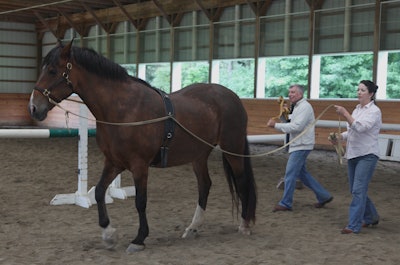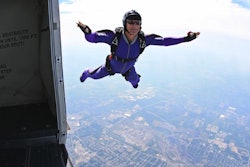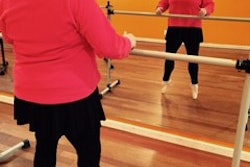
During her tenure as a high-ranking communications executive at global powerhouses that include Nestle, Bristol-Myers Squibb and Revlon Inc., Marie-Claude Stockl was no stranger to stress. This self-described “horse crazy girl” found her stress relief amidst the smell of horses and hay. One day, she realized weekends at the barn were not enough for her, and she had to be around horses every day.
She convinced her husband, Larry Stockl, a former American Express executive, to relocate from Manhattan to their weekend home in Hudson, New York. And for the next 10 years, she balanced her time her country life and her work as a coaching consultant for large companies, including Procter & Gamble and Merck, and world-class athletes and movie stars.
But in 2005, she took both jumped out of the corporate world and landed at The Horse Institute, a program she formed in tandem with the nonprofit Equine Assisted Growth and Learning Association. While many times horses are used to treat people with physical disabilities or profound mental disorders, Marie-Claire instead combined her work in the corporate world, her coaching abilities and her love of horses to offer training for corporate execs and their teams to build their coping skills in the workplace.
“I’ve worked in the corporate world and as a facilitator for a long time, and I’ve seen the stresses go up and up every decade,” Marie-Claire says. “Today, it’s 24/7. You always have to be connected. But what’s interesting is I’ve never seen someone pull out a smartphone when they are working with horses. You cannot be distracted when you’re dealing with an 1,100-pound animal.”
The program’s clients include supply chain execs who wrestle with meetings, deadlines, professional relationships on a daily basis. Marie-Claude states the pressures ramp up even if these executives work in a highly regulated environment, such as the food and beverage or logistics industries. It’s imperative that these executives find a way to positively deal with pressures that include financial concerns, collaboration with suppliers, risk management, supply chain disruptions, and increased customer demands. All areas, where The Horse Institute stands uniquely poised to help.
Guided interaction with horses can help executives develop their emotional intelligence quotients, which better equips them to handle the stresses of their jobs. “Exercises performed on the ground with horses help people develop positive teamwork and leadership skills,” Marie-Claire says. “Equine-assisted learning can be a major force for positive change in the workplace.”
Program participants are asked to do six 20-minute activities during their day at the barn. They debrief after each one and discuss how to apply what they’ve learned to the corporate world.
One activity involves participants rounding up horses that represent “new hires.” Teams of two to three are asked to meet and greet the horses, and put a halter on one of them, then lead the horse back to the viewing area or “headquarters.”
“Every time we’ve done this, corporate execs have taken this as a competition; they go for the kill and catch the horse,” she says. “But this isn’t a competition, it’s about communication.”
She says this exercise typically leads to a discussion about the siloed structure of many corporations. “Companies are too big, and departments don’t communicate well with each other,” she says. “This exercise leads to a conversation about breaking down siloes and working as a team.”
A day with the horses helps participants learn the value of being honest in their interactions at work. “Leaders need to be very authentic and congruent; what they say has to come from the heart,” Marie-Claire says. “Horses know when they say one thing, but their body language screams another, and they will walk away. These exercises help leaders think about how they communicate--verbally and nonverbally.”
The day wraps up with each participant writing action plans based on what they’ve discovered about themselves. These plans include the things they will do for the entire group as well plans to help them improve as leaders.
And, for some, the day leads to a new lifestyle that includes horses. Marie-Claire recalls one executive who was not a horse person. She didn’t want to participate at first; “she was afraid of them,” she says. “By the end of the day, she was the person the horses took to the most. And, today, she owns a horse of her own.”










